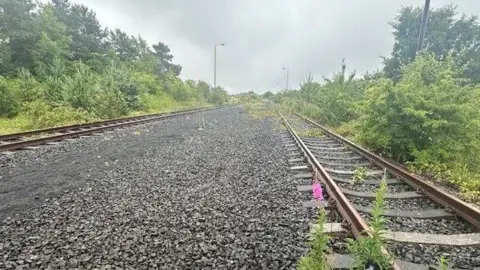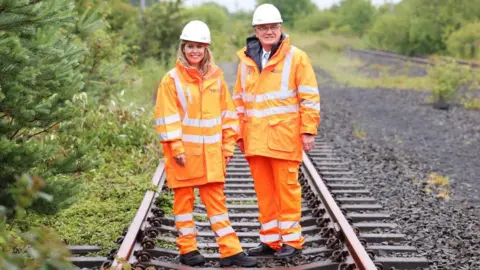By Mark Denten, BBC Look North • Daniel Holland, Local Democracy Reporting Service
 BBC
BBCMore funding has been announced in an effort to extend the Tyne and Wear Metro.
North East mayor Kim McGuinness has put more than £8m towards creating a business case for the Washington extension via the northern section of the disused Leamside Line.
The Labour mayor said she would not have pledged the money if she “didn’t think that we would be able to deliver the Metro”.
The plans could see the network expand from its current endpoint in South Hylton, through to Washington, then onto Follingsby and rejoin at Pelaw.
 LDRS
LDRSHowever, the opening of a “Washington Metro Loop” is still years away and is expected to cost an estimated £745m, the Local Democracy Reporting Service (LDRS) said.
It would be the first extension of the system in more than 20 years.
Ms McGuinness said: “If I didn’t think that we would be able to deliver the Metro, I wouldn’t do the business case.
“This is a lot of money that we’re putting into the exploration, and, ultimately, what that means to lead to is Metros running on this track.”
Gateshead Council leader Martin Gannon, who is the deputy mayor, claimed “rather than a project that was decades out, we are now within touching distance” and insisted he was “very confident” of finding the cash to deliver it.
‘Think differently’
Cathy Massarella, managing director at Metro operator Nexus, said there would be “a lot of activity” on the Leamside Line with ground investigations taking place.
“That will allow us to build a picture of what we need to build,” she said.
The Leamside Line was dropped from a list of pledges made under former prime minister Rishi Sunak’s Network North transport programme, less than 24 hours after it was announced.
The Labour Party has also refused to commit to delivering the Leamside Line, the full restoration of which would cost well over £1bn.
Ms McGuinness told the LDRS she “will be having conversations about how we bring together the money”, including asking the new Labour government for funding.
She also warned that regional transport officials will have to “think differently” and look at partnerships with private businesses too.

